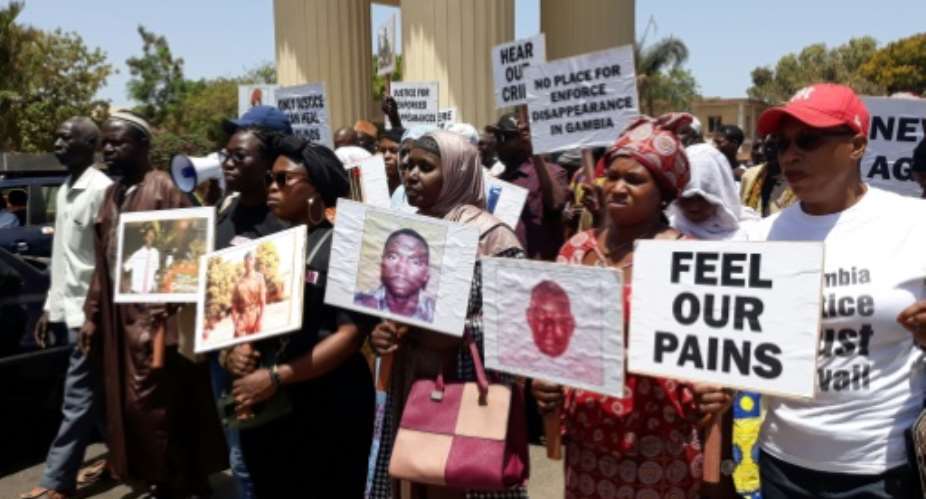A truth commission in the tiny West African state of The Gambia began hearing witness testimony on Monday as it set about investigating rights violations committed by the regime of Yahya Jammeh.
Modelled on South Africa's investigation into its apartheid era, the commission will hold hearings into Jammeh's 22-year era of oppression which ended in 2016 after he was forced from power.
President Adama Barrow has hailed the commission as a step towards national healing and a way to prosecute those responsible and offer some closure to victims and families.
On Monday, Ebrima Chongan, police assistant inspector general before the 1994 coup which brought Jammeh to power, testified how he was dragged from police headquarters and held in solitary confinement in a prison outside the capital Banjul after the putsch.
"We were arrested by the soldiers at the police headquarters in Banjul. They dragged us and bundled us in a pickup vehicle. We were taken to Mile Prison where we were kept in solitary confinement," he said.
"The cell we were kept in had rats. The junta classified us as security detainees and a threat to national security."
After Jammeh took over The Gambia, the smallest country on land in Africa, he installed a network of oppression, driven by the police, National Intelligence Agency (NIA) and a death squad called the Junglers.
His reign began to fall apart in 2016, when he suffered an electoral defeat at the hands of Barrow, then an opposition leader.
He refused to step down, but was forced out after other West African countries intervened militarily and diplomatically. He flew into self-imposed exile in Equatorial Guinea.
The Truth, Reconciliation and Reparations Commission (TRRC) aims at using a court-like approach to investigate how abuse began and became systemic, as well as its impacts.
The commission is empowered to advise prosecution of perpetrators and recommend financial compensation to victims.
Its board members are drawn from all the country's major regions, its five main ethnic groups and two religions, led by a retired UN diplomat, Lamin Sise.





 Akufo-Addo spotted ordering chiefs to stand for his handshake
Akufo-Addo spotted ordering chiefs to stand for his handshake
 Akufo-Addo ‘disrespects’ every chief in Ghana except Okyenhene — NDC Communicato...
Akufo-Addo ‘disrespects’ every chief in Ghana except Okyenhene — NDC Communicato...
 Supreme Court clears way for dual citizens to hold key public positions
Supreme Court clears way for dual citizens to hold key public positions
 Be transparent, don’t suppress the truth – Prof. Opoku-Agyemang to Jean Mensa
Be transparent, don’t suppress the truth – Prof. Opoku-Agyemang to Jean Mensa
 ‘I won’t tell the world I was only a driver’s mate during challenges’ – Prof Jan...
‘I won’t tell the world I was only a driver’s mate during challenges’ – Prof Jan...
 We’ll prosecute corrupt officials of Akufo-Addo’s govt – Prof Jane Naana
We’ll prosecute corrupt officials of Akufo-Addo’s govt – Prof Jane Naana
 [Full text] Acceptance speech by Prof Jane Naana Opoku-Agyemang as 2024 NDC Runn...
[Full text] Acceptance speech by Prof Jane Naana Opoku-Agyemang as 2024 NDC Runn...
 Election 2024: Don’t be complacent, we haven’t won yet – Asiedu Nketia cautions ...
Election 2024: Don’t be complacent, we haven’t won yet – Asiedu Nketia cautions ...
 Election 2024: Stop fighting over positions in Mahama’s next govt – Asiedu Nketi...
Election 2024: Stop fighting over positions in Mahama’s next govt – Asiedu Nketi...
 Prof Jane Naana Opoku-Agyemang will restore dignity of vice presidency – Fifi Kw...
Prof Jane Naana Opoku-Agyemang will restore dignity of vice presidency – Fifi Kw...
